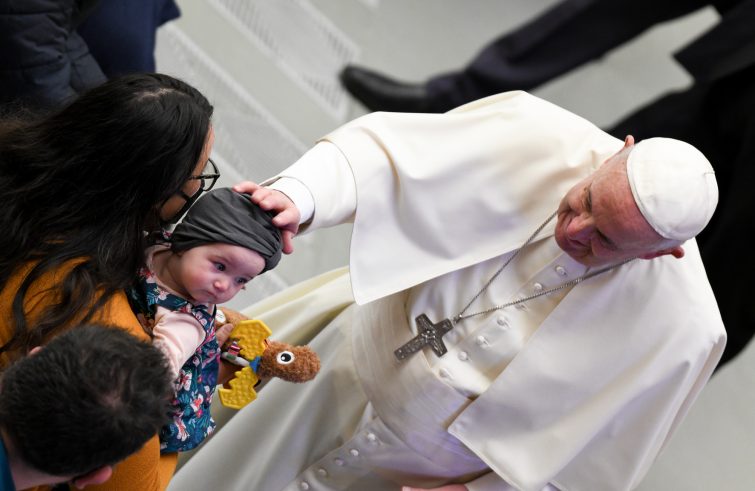
“The Olympic and Paralympic Winter Games are about to open in Beijing, on 4 February and 4 March respectively”, the Pope said in his closing remarks today, before the special greetings to Italian-speaking pilgrims that conclude the Wednesday general audience in Paul VI Hall. “I warmly greet all participants”, Francis said: “I wish the organizers every success and the athletes the very best.” “Sport, with its universal language, can build bridges of friendship and solidarity between individuals and peoples of all cultures and religions”, Francis assured, welcoming the fact that to the historic Olympic motto “Citius, Altius, Fortius” — that is, “faster, higher, stronger” — “the International Olympic Committee has added the word ‘communiter’, that is, ‘together’: so that the Olympic Games may bring about a more fraternal world.” Francis then extended a “special thought to the whole Paralympic world: we will win the most important medal together, if the example of athletes with disabilities helps everyone to overcome prejudices and fears and to make our communities more welcoming and inclusive. This is the real gold medal”, the Pope underlined. Francis made known that he also follows “with attention and emotion the personal stories of refugee athletes.” His hope is that “their testimonies” may “help to encourage civil societies to open up with ever greater confidence to all, leaving no one behind.” Shortly before, the Holy Father extended his umpteenth appeal for the “tormented population” of Myanmar, calling on “the international community to work for reconciliation between the parties concerned.” Recalling the celebration of the second International Day of Human Brotherhood on February 4, Francis shared his hope that “concrete steps will be taken together with the believers of other religions, and also with people of good will, so that we can all live in peace, as brothers and sisters”, as called for in the Document on Human Fraternity and for World Peace and Living Together, jointly signed by the Holy Father and the Grand Imam of Al-Ahzar on 4 February 2019.
“Sometimes even Christianity can fall into forms of devotion that seem to reflect a mentality that is more pagan than Christian”,
the Pope denounced in his catechesis, devoted to the Communion of Saints. “Our prayer and our devotion of the faithful people is not based, in these cases on trust in a human being, or in an image or an object, even when we know that they are sacred”, the Pope said, pointing out: “It is not the saints who work miracles, but only the grace of God that acts through them.” “Christ is the bond that unites us to him and to each other, and which has a specific name: this bond that unites us all, between ourselves and us with Christ, it is the communion of saints”, the Pope added in unscripted remarks: “Miracles are done by God, by the grace of God acting through a holy person, a righteous person. There are people who say, ‘I believe in this saint.’ No, this is wrong. The saint is an intercessor, one who prays for us and we pray to him, and he prays for us and the Lord gives us grace: The Lord, through the saint.”
“The communion of saints is the Church”,
Francis explained citing the Catechism of the Catholic Church:
“The Church is the community of saved sinners.”
“No one can exclude themselves from the Church, we are all saved sinners!”. Francis’ appeal: “We are all one body, all united through faith, through baptism… All in communion: united in communion with Jesus Christ. And this is the communion of saints.” “In virtue of the communion of saints, this union, every member of the Church is bound to me in a profound way. and this bond is so strong that it cannot be broken even by death”, the Pope assured:
“the communion of saints does not concern only those brothers and sisters who are beside me at this historic moment, or who live in this historic moment, but also those who have concluded their journey, the earthly pilgrimage and crossed the threshold of death. They too are in communion with us.”
“In Christ no one can ever truly separate us from those we love because the bond is an existential bond, a strong bond that is in our very nature”, the Pope commented ad lib: “only the manner of being together with one another them changes, but nothing and no one can break this bond.”
“The communion of saints holds together the community of believers on earth and in heaven, and on earth the saints, the sinners, all”, Francis remarked: including “those who have denied the faith, who are apostates, who are the persecutors of the Church, who have denied their baptism. The blasphemers, all of them.”
“The relationship of friendship that I can build with a brother or sister beside me, I can also establish with a brother or sister in heaven”, reiterated the Pope. “What we call devotion to a saint — ‘I am very devoted to this or that saint’ —is actually a way of expressing love from this very bond that unites us.” Francis thus concluded Wednesday’s general audience “with a prayer to St Joseph to which I am particularly attached and which I have recited every day for more than 40 years.” “It is a prayer that I found in a prayer book of the Sisters of Jesus and Mary, from the end of the eighteenth century.” “It is very beautiful, but more than a prayer it is a challenge, to this friend, to this father, to this our guardian, Saint Joseph.” Francis said to the faithful: “It would be wonderful if you could learn this prayer and repeat it.”











